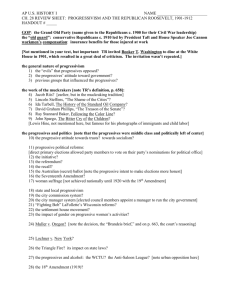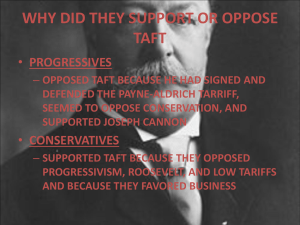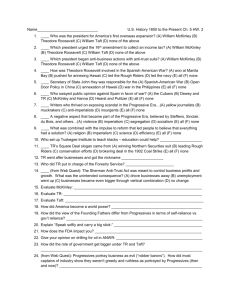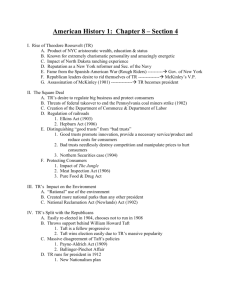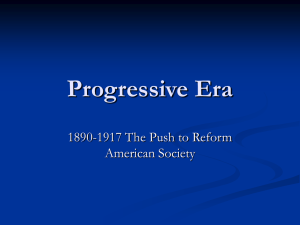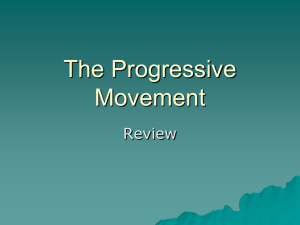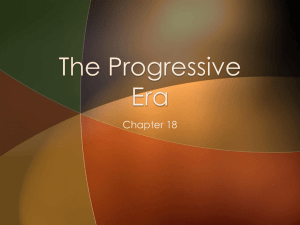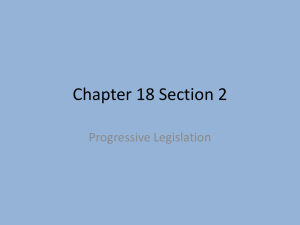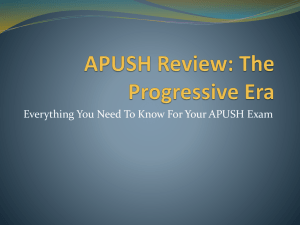Chapters 27 & 28 Study Guide
advertisement
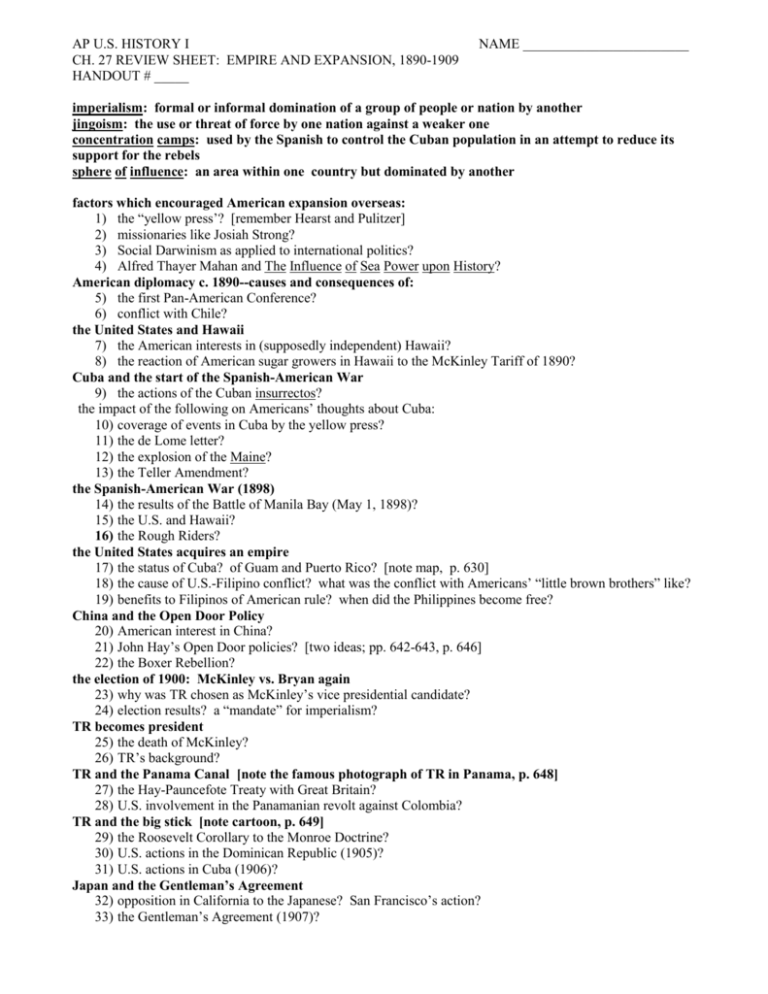
AP U.S. HISTORY I CH. 27 REVIEW SHEET: EMPIRE AND EXPANSION, 1890-1909 HANDOUT # _____ NAME ________________________ imperialism: formal or informal domination of a group of people or nation by another jingoism: the use or threat of force by one nation against a weaker one concentration camps: used by the Spanish to control the Cuban population in an attempt to reduce its support for the rebels sphere of influence: an area within one country but dominated by another factors which encouraged American expansion overseas: 1) the “yellow press’? [remember Hearst and Pulitzer] 2) missionaries like Josiah Strong? 3) Social Darwinism as applied to international politics? 4) Alfred Thayer Mahan and The Influence of Sea Power upon History? American diplomacy c. 1890--causes and consequences of: 5) the first Pan-American Conference? 6) conflict with Chile? the United States and Hawaii 7) the American interests in (supposedly independent) Hawaii? 8) the reaction of American sugar growers in Hawaii to the McKinley Tariff of 1890? Cuba and the start of the Spanish-American War 9) the actions of the Cuban insurrectos? the impact of the following on Americans’ thoughts about Cuba: 10) coverage of events in Cuba by the yellow press? 11) the de Lome letter? 12) the explosion of the Maine? 13) the Teller Amendment? the Spanish-American War (1898) 14) the results of the Battle of Manila Bay (May 1, 1898)? 15) the U.S. and Hawaii? 16) the Rough Riders? the United States acquires an empire 17) the status of Cuba? of Guam and Puerto Rico? [note map, p. 630] 18) the cause of U.S.-Filipino conflict? what was the conflict with Americans’ “little brown brothers” like? 19) benefits to Filipinos of American rule? when did the Philippines become free? China and the Open Door Policy 20) American interest in China? 21) John Hay’s Open Door policies? [two ideas; pp. 642-643, p. 646] 22) the Boxer Rebellion? the election of 1900: McKinley vs. Bryan again 23) why was TR chosen as McKinley’s vice presidential candidate? 24) election results? a “mandate” for imperialism? TR becomes president 25) the death of McKinley? 26) TR’s background? TR and the Panama Canal [note the famous photograph of TR in Panama, p. 648] 27) the Hay-Pauncefote Treaty with Great Britain? 28) U.S. involvement in the Panamanian revolt against Colombia? TR and the big stick [note cartoon, p. 649] 29) the Roosevelt Corollary to the Monroe Doctrine? 30) U.S. actions in the Dominican Republic (1905)? 31) U.S. actions in Cuba (1906)? Japan and the Gentleman’s Agreement 32) opposition in California to the Japanese? San Francisco’s action? 33) the Gentleman’s Agreement (1907)? CH. 28 REVIEW SHEET: PROGRESSIVISM AND THE REPUBLICAN ROOSEVELT, 1901-1912 HANDOUT # _____ GOP: the Grand Old Party (name given to the Republicans c. 1900 for their Civil War leadership) the “old guard”: conservative Republicans c. 1910 led by President Taft and House Speaker Joe Cannon workmen’s compensation: insurance benefits for those injured at work the general nature of progressivism 1) the “evils” that progressives opposed? 2) the progressives’ attitude toward government? 3) previous groups that influenced the progressives? the work of the muckrakers [note TR’s definition, p. 658]: 4) Jacob Riis? [earlier, but in the muckraking tradition] 5) Lincoln Steffens, “The Shame of the Cities”? 6) Ida Tarbell, The History of the Standard Oil Company? [Lewis Hine, not mentioned here, but famous for his photographs of immigrants and child labor] the progressives and politics [note that the progressives were middle class and politically left of center] 7) the progressive attitude towards trusts? towards socialism? progressive political reforms: [direct primary elections allowed party members to vote on their party’s nominations for political office] 8) the initiative? 9) the referendum? 10) the recall? 11) the Seventeenth Amendment? 12) woman suffrage [not achieved nationally until 1920 with the 19th Amendment] 13) “Fighting Bob” LaFollette’s Wisconsin reforms? 14) the settlement house movement? 15) the impact of gender on progressive women’s activities? 16) Muller v. Oregon? [note the decision, the “Brandeis brief,” and on p. 663, the court’s reasoning} 17) Lochner v. New York? 18) the Triangle Fire? its impact on state laws? 19) the progressives and alcohol: the WCTU? the Anti-Saloon League? [note urban opposition here] 20) the 18th Amendment (1919)? TR as a progressive president (1901-1909): the Square Deal [note quote, p. 656] and three C’s control of corporations 21) the demands of the anthracite (hard coal) miners? 22) TR’s response? 23) TR’s attitude toward trusts? [ note cartoon, p. 666] consumer protection 24) Upton Sinclair’s intent in writing The Jungle? the impact of The Jungle on consumers? 25) the Meat Inspection Act? why did the largest meat packers support this bill? 26) the Pure Food and Drug Act? conservation of natural resources 27) TR’s actions in regard to forests? 28) TR and Gifford Pinchot’s “middle position” (between business interests and “romantic preservationists”)? 29) TR’s expectations for potential successor William Howard Taft? [text, p. 673 and cartoon, p. 674] 30) the results of the election of 1908? [note also the Socialist candidate and his vote total] 31) Roosevelt’s contributions as president? William Howard Taft as president (1909-1913) 32) Taft’s political handicaps? 33) dollar diplomacy? 34) Taft and the trusts? [note the TR comparison here] 35) the election of 1912
